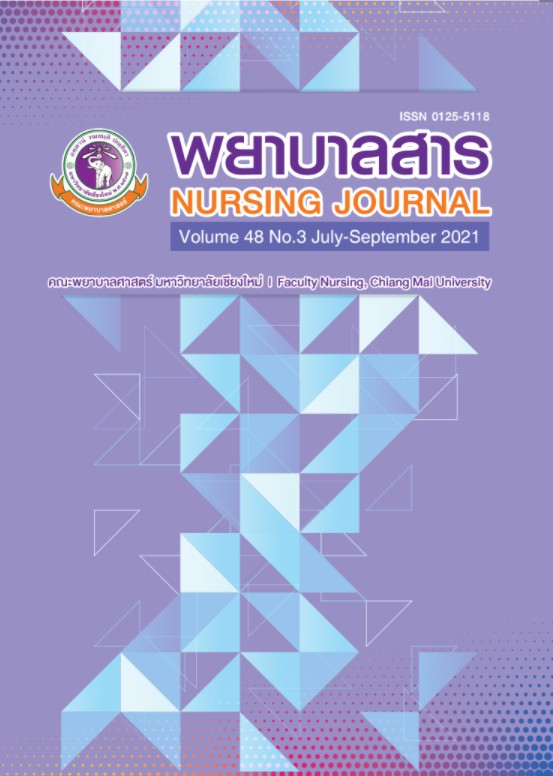Factors Related to Nurses’ Practices in Promoting the Care of Mothers to Enhance the Neurodevelopment of Preterm Infants
Keywords:
Nurses’ practices, Promoting the care of mothers, Enhance the neurodevelopment, Preterm infants, Factors relatedAbstract
The promotion of maternal care by nurses is important in reducing the effects of abnormal neurodevelopment. These practices are promote neurodevelopment to proceed continuously and appropriately. This descriptive correlational study aimed to explore the relationship between knowledge, attitudes and nursing practices in promoting maternal care to enhance neurodevelopment in preterm infants. The participants were registered nurses based in the neonatal intensive care unit of six tertiary hospitals in northern Thailand. Using purposive sampling, 103 nurses were selected. The data collection period was from December 2018 to February 2019. The research instruments consisted of (1) a nurse demographic questionnaire, (2) the nursing practices to promote maternal care to enhance the neurodevelopment of preterm infants questionnaire, and (3) the factors related to nursing practices to promote maternal care to enhance the neurodevelopment of preterm infants questionnaire. Data analysis included descriptive statistics and Spearman's correlation coefficient.
The results of this study showed that:
- Nurses had a high level of knowledge in promoting maternal care to enhance the neurodevelopment of preterm infants (98.10%).
- Attitudes toward promoting maternal care to enhance the neurodevelopment of preterm infants were high (86.40%).
- Nursing practices in promoting maternal care to enhance the neurodevelopment of preterm infants were at a high level in 44.70 % of participants.
- Knowledge had a low positive correlation with nursing practices in promoting maternal care to enhance the neurodevelopment of preterm infants (r = 0.25, p < .01) and attitude had a moderate positive correlation with nursing practices in promoting maternal care to enhance the neurodevelopment of preterm infants (r = 0.32, p < .01).
The results of this study provide basic information that can be used to promote knowledge and good attitudes in nurses. This will make nursing practice in promoting maternal care to enhance the neurodevelopment of preterm infants more effective.
References
Altimier, L., & Phillip, R. M. (2016). The neonatal integrative developmental care model:Advanced clinical applications of the seven core measures for neuroprotective family-centered developmental care. Newborn & Infant Nursing Reviews, 16(4), 230-244.
Apichutboonchock, S. (2013). Parents, participation on their preterm development support in neonatal intensive care unit. Vajira Medical Journal, 57(1), 65-72. (in Thai)
Baghlani, R., Mohammad-Bagher, H., Safaiyan, A., Alizadeh, M., & Arshadi- Bostanabad, M. (2019). Neonatal intensive care unit nurses’ perceptions and knowledge of newborn individualized developmental care and assessment program: A multicenter study. Iranian Journal of Nursing and Midwifery Research, 24(2), 113-117. doi: 10.4103/ijnmr. IJNMR_54_18
Blencowe, H., Cousens, S., Oestergaard, M. Z., Chou, D., Moller, A. B., Narwal, R., . . . Lawn, J. E. (2012). National, regional and worldwide estimates of preterm birth rates in the year 2010 with time trends for selected countries since 1990: A systematic analysis and implications. The Lancet, 379(9832), 2162-2172. doi: 10.1016/S0140-6736(12)60820-4
Bloom, B. S. (1975). Taxonomy of educational objectives: the classification of educational goals: handbook 1: Cognitive domain (20th ed.). New York: NY, David McKay.
Browne, J. V. (2011). Developmental care for high-risk newborns: Emerging science, clinical application, and continuity from newborn intensive care unit to community.
Clinics in Perinatology, 38(4), 719-729. doi: 10.1016/j.clp.2011.08.003
Burns, N., & Grove, S. K. (2009). The practice of nursing research: appraisal, synthesis, and generation of evidence (6th ed.). St. Louis: Saunders Elsevier.
Capolingua, M., & Jill, F. J. (2018). Neonatal nurses’ self-reported practices, knowledge and attitudes toward premature infant pain assessment and management. Journal of Neonatal Nursing, 24(4), 218-224. doi: 10.1016/j.jnn.2018.03.002
Holditch-Davis, D., & Blackburn, S.T. (2014). Neurobehavioral development. In C. Kenner & J. Lott (Eds.), Comprehensive neonatal nursing care (5th ed., pp. 689-721). New York: Spring Publishing Company.
Khantawongsa, K., Urharmnuay, M., & Klunklin, P. (2017). Factors related to kangaroo mother care promotion for preterm infants, Nursing Journal, 44(1). 22-33. (in Thai)
Kim, J., & Shin, H. (2014). Concept analysis of developmental care for preterm infants: Hybrid model. Child Health Nursing Research, 20(4), 350–358. doi: 10.4094/chnr. 2014.20.4.350
Liu, L., Oza, S., Hogan, D., Chu, Y., Perin, J., . . . Zhu, J. (2016). Global, regional, and national causes of under-5 mortality in 2000-15: An updated systematic analysis with implications for the sustainable development goals. The Lancet, 388(10063), 3027-3035. doi: 10.1016/S0140-6736(16)31593-8
Matayaboon, D., Klunklin, P., & Urharmnuay, M. (2016), Practices of Nurses and Related Factors on Developmental Care for Preterm Infants. Nursing Journal, 43(4).1-11. (in Thai)
Mosqueda, R., Castilla, Y., Perapoch, J., De la Cruz, J., López-Maestro, M., & Pallás, C. (2013). Staff perceptions on newborn individualized developmental care and assessment program (NIDCAP) during its implementation in two Spanish neonatal unit. Early Human
Development, 89, 27-33. doi: 10.1015/j.earlhumdev.2012.07.013
Park, J., & Kim, J. (2019). Factors Influencing Developmental Care Practice Among Neonatal Intensive Care Unit Nurses. Journal of Pediatric Nursing, 47, 10-15. doi: 10.1016/j.pedn.2019.03.014
Srisatidnarakul, B. (2010). The methodology in nursing research. Bangkok: Youandi intermedia.
Thampanichawat, W., (2016). (Eds.)., Developmental care for preterm infants. In
Thampanichawat, W., Rungamornrat, S., & Payakkaraung, S, nursing care for high risk Neonates (pp. 51-73). Bangkok: Faculty of Nursing, Mahidol University. (In Thai)
World Health Organization. (2018). Preterm Birth. Retrived from https://www.who.int/news-room/fact-sheets/detail/preterm-birth
Downloads
Published
How to Cite
Issue
Section
License
บทความที่ได้รับการตีพิมพ์เป็นลิขสิทธิ์ของวารสารพยาบาลสาร
ข้อความที่ปรากฏในบทความแต่ละเรื่องในวารสารวิชาการเล่มนี้เป็นความคิดเห็นส่วนตัวของผู้เขียนแต่ละท่านไม่เกี่ยวข้องกับมหาวิทยาลัยเชียงใหม่ และคณาจารย์ท่านอื่นๆในมหาวิทยาลัยฯ แต่อย่างใด ความรับผิดชอบองค์ประกอบทั้งหมดของบทความแต่ละเรื่องเป็นของผู้เขียนแต่ละท่าน หากมีความผิดพลาดใด ๆ ผู้เขียนแต่ละท่านจะรับผิดชอบบทความของตนเองแต่ผู้เดียว






